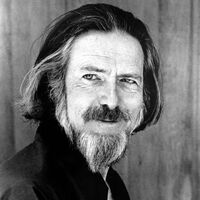Why do we love nonsense? Why do we love Lewis Carroll with his „Twas brillig, and the slithy toves did gyre and gimble in the wabe, all mimsy were the borogoves, and the mome raths outgrabe...”? Why is it that all those old English songs are full of “Fal-de-riddle-eye-do” and „Hey-nonny-nonny” and all those babbling choruses? Why is it that when we get „hep” with jazz we just go „Boody-boody-boop-de-boo” and so on, and enjoy ourselves swinging with it? It is this participation in the essential glorious nonsense that is at the heart of the world, not necessarily going anywhere. It seems that only in moments of unusual insight and illumination that we get the point of this, and find that the true meaning of life is no meaning, that its purpose is no purpose, and that its sense is non-sense. Still, we want to use the word “significant.” Is this significant nonsense? Is this a kind of nonsense that is not just chaos, that is not just blathering balderdash, but rather has in it rhythm, fascinating complexity, and a kind of artistry? It is in this kind of meaninglessness that we come to the profoundest meaning.
